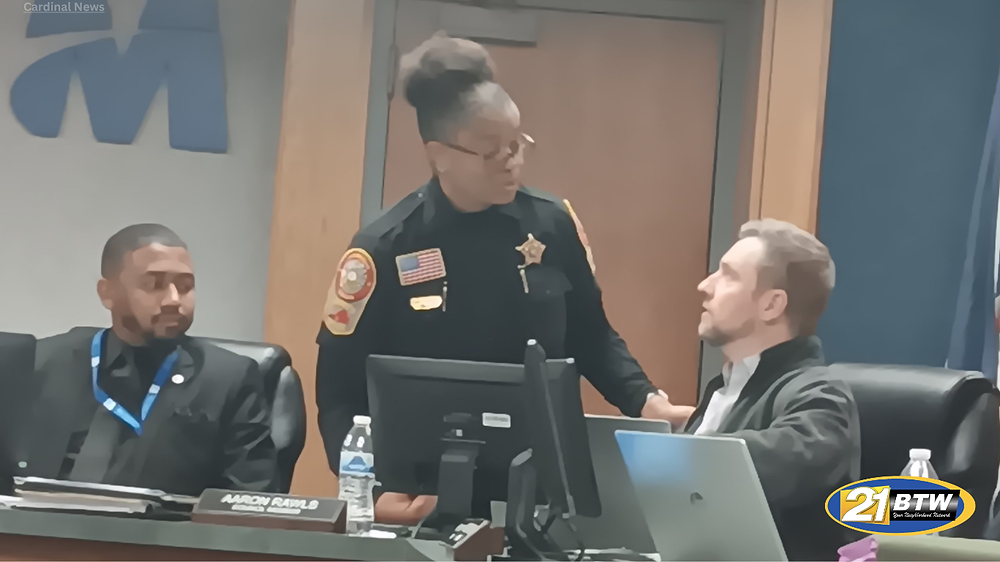
Federal agents in plainclothes on Friday detained at least 11 people at the immigration court in the Earle Cabell Federal Building in downtown Dallas, continuing a dayslong enforcement campaign that is happening at courts around the country.
Reporters for The Dallas Morning News on Friday witnessed agents detain 11 people, all of whom had their immigration cases dismissed before their detention. They were similar to the four cases that reporters observed a day earlier as the federal government ramps up its expedited removal process.
Among those detained Friday was Alberto Rivas Zara, a Venezuelan man who was sitting in Courtroom 4 without representation. He acknowledged to Judge Xiomara Davis-Gumbs that he entered the United States without authorization at or near El Paso in March 2024 before filing an application for asylum later that year.
Amid the discussion, the government attorney moved to dismiss his case. Davis-Gumbs then asked if Rivas Zara would like to accept or appeal, and he opted for the latter.
As Rivas Zara exited the courtroom with a packet containing instructions for how to appeal by June 23, a plainclothes federal agent sitting on the opposite bench stood up and followed him out. Several others, none of whom had visible law enforcement badges, moved in and detained the man in the hallway.
Also waiting in the area was Shane O’Brien, a Dallas resident who had come to the immigration court after seeing an alert about Immigration and Customs Enforcement agents being there via an anti-ICE app. He asked to go by his middle name to protect himself against retaliation.
“Where’s your badge?” O’Brien said, filming the agents with his phone as they led Rivas Zara through a set of double doors. “Where’s your warrant?”
O’Brien later told The News he was angry to see people being detained at the immigration court, comparing them to “ambushes.”
“If they were just coming over here and just not even trying to do the right thing and hiding out, then that would be one thing,” he said. “But these are people actually trying to follow the rules and have their cases heard.”
As of Friday evening, Rivas Zara was at ICE’s field office in Dallas, according to online records.
Some people who were detained earlier have been moved to detention centers. Two Venezuelan men whom The News witnessed being detained Thursday afternoon, including one who attempted to avoid federal officers by staying in a courtroom before being told to leave by the judge, were at Prairieland Detention Center as of Friday evening. The facility in Alvarado is about 35 miles southwest of downtown Dallas.
The News reached out to ICE for comment but didn’t immediately receive a response Friday.
In a Thursday statement, a senior Department of Homeland Security spokesperson said President Donald Trump’s administration is implementing the rule of law and placing people into a fast-track deportation process known as expedited removal.
“Most aliens who illegally entered the United States within the past two years are subject to expedited removals,” the statement continued. “ICE is now following the law and placing these illegal aliens in expedited removal, as they always should have been.”
Migrants who express a valid, credible fear about being returned to their country of origin will be allowed to continue with their case, the statement said.
Expedited removal allows immigration officers to deport migrants without the usual process of appearing before an immigration judge, according to the American Immigration Council.
The policy has historically been limited to people who were apprehended within two weeks of their arrival and within 100 miles of the border. Trump tried to expand the use of expedited removal during his first term, but a federal judge blocked the policy from taking effect in 2019.
Dan Gividen, a lawyer who previously served as deputy chief counsel for ICE’s Dallas office, said the enforcement actions currently happening at the immigration court were “discussed many times” internally during the first Trump administration. But “the biggest difference,” he said, is that the idea faced more pushback at the time from federal employees.
On Jan. 20, the first day of his second term, Trump signed an executive order calling for the Homeland Security secretary to rapidly deport migrants.
DHS filed a notice expanding expedited removal to anyone who hasn’t been in the U.S. for more than two years. Around the same time, DHS issued guidance on how to implement the expanded expedited removal policy.
The guidance advised canceling an individual‘s immigration proceeding and placing them into the fast-track deportation process.



